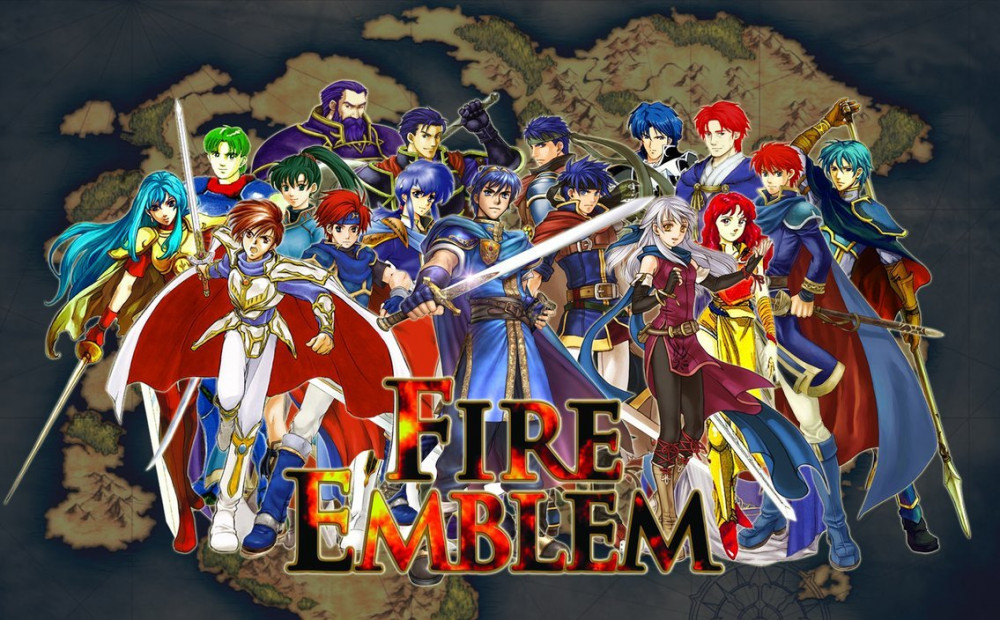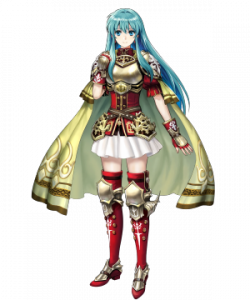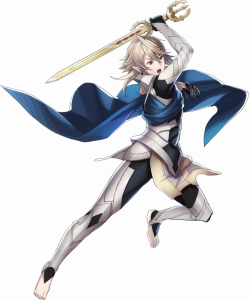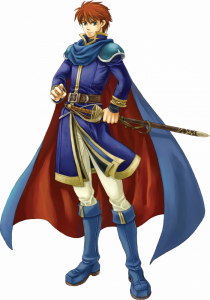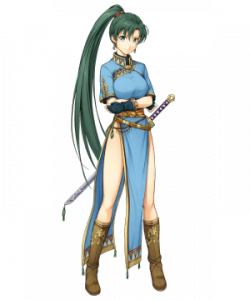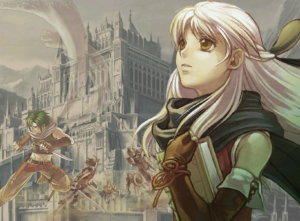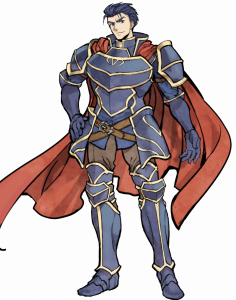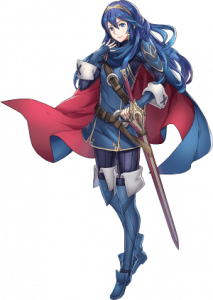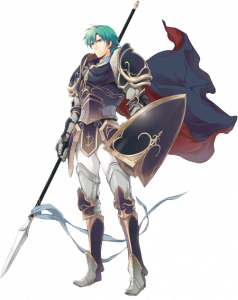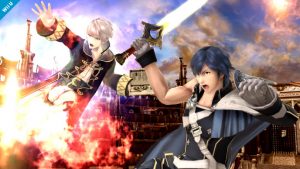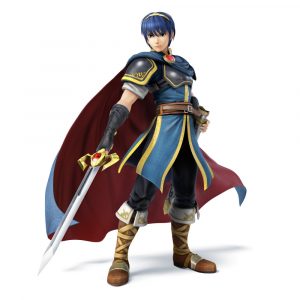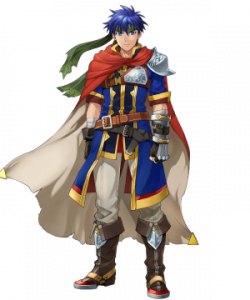Tyler’s List
11. Eirika (Sacred Stones)
Remember, every Lord on this list is awesome in their own way. I put Eirika at the bottom of the list, but I’m sure others could make a compelling argument for why she’s one of the series’s best.
I consider Eirika to be the least interesting Lord out there. When I think of good characters I consider three big points. Do they have a distinctive personality, have a significant weakness to overcome, and have meaningful growth afterward? If yes, the character is probably strong. Eirika passes the first test, the Distinctive Personality Test, easily. Eirika is a kind-hearted and gentle woman who possesses great inner strength. She believes in peace and believes that conflict can be solved through words rather than violence. We see this several times throughout Sacred Stones. In her support with Ephraim, he calls her a gentle soul and she responds by saying “I just pray that this fighting will end as swiftly as possible. No one desires this war. So why must it continue?” She is naive and innocent as well. When the Demon King acts like Lyon and asks for her to give him the Sacred Stone, Eirika is all to willing to walk into his trap.
Eirika fails the second two tests, however. From the get-go she is portrayed as a pacifist who is naive and innocent, and we never really see that change. She does question her convictions for just a moment in Chapter 5, when the a Grado Shaman tries to get Renais citizens devoured by a spider, but after that she goes right back to her old self. She never really questions her views on the war, even when her brother tells her that her opinion that nobody likes war is outright incorrect. For those reasons, she fails the Meaningful Growth Test. Eirika never really changes, nor does she let any doubt she has in her convictions effect her actions. She also doesn’t have a significant weakness that she overcomes. She’s trusting to a fault, but we never see her change that. Just as she fell for Colm’s trick when stealing her bracelet in chapter 3, she fell for the Demon King’s near the endgame. She’s very much a Mary Sue, and that makes her feel bland compared to the other characters of the series. It doesn’t help that she shares the spotlight with Ephraim, either.
10. Corrin (Fates)
I’m a big Corrin fan, but that doesn’t make me blind to his failures as a protagonist. Still, I rank him above her because his ability to support every other character in the game makes for some memorable moments.
Corrin’s very much a straightforward main character. He’s incredibly ignorant to the ways of the world, overly trusting, and gentle. He’s a pacifist to the core, and regardless of the path you choose he just wants to live in peace with his family. While his personality is clear enough, he constantly frustrates players through his refusal to evolve.
It’s tricky to place Corrin on this list because he has three unique character arcs. Of those arcs, Birthright stands out as the best. There, he chooses to leave the people he loves in order to return to a family he doesn’t really know because he knows it’s the right thing to do. We see him reject everything he was taught growing up in one fateful moment, and all he has left are his values. Corrin holds onto his sense of justice throughout the game. He has a clear inner conflict, struggling with battling against those he loves in order to do what’s right. When he finally overcomes this conflict, it’s in a powerful and believable way. Seeing Xander kill his sister and refusing to give into her final wish pushes him over the edge. He fights without holding back, while Xander does the opposite. Then, and only then, is Corrin capable of surpassing his older brother and fulfilling the destiny Xander believed he would.
If Corrin’s entire body of work was Birthright, I’d have ranked him significantly higher on the list. But Conquest and Revelations Corrin exist and they’re far worse iterations of the character. In Conquest, Corrin chooses his love for his siblings over his values. While he still holds his ideals close to his heart, we don’t see him struggle to balance the two. He’s conflicted about it, for sure, but he constantly chooses sibling love over values. There’s a moment where he tells Azura he feels it may have been wrong to side with Nohr, but instead of doing something with that the game just has him go back to dismantling Hoshido. He doesn’t like doing it, and he does question things, but he never resolves the conflict, balancing love with virtue, adequately. Had Conquest featured a chapter or two where Corrin did decide to abandon Nohr, only for his Nohrian Siblings to show just how deep their love for him was, perhaps Nohrrin would be a better character.
Revelation’s Corrin rejects both paths in search of finding peace, and the game never puts him in any uncomfortable situation. The Corrin you meet in the very beginning of the game is the Corrin you see at the end. He becomes a better leader, sure, but Corrin himself doesn’t stare down any internal conflict. He really never even has one.
9. Eliwood
It pains me to put Eliwood this low on the list, because I’m very partial to him. Eliwood benefits greatly from the world around him. Fire Emblem 7, in my opinion, had a great sense of world building and personality that is reflected by its main characters.
Eliwood is a remarkable young man. He’s admired by his fellow Lycian nobles, so much so that he was able to convince them to remain neutral in Lyndis’s quest to defeat Lord Lundgren. He’s an excellent fighter, possesses poise, and respects others. Still, Eliwood falls into some similar pitfalls as Eirika. The road he travels forces him through more hardship than she, making his arc more interesting, but Eliwood doesn’t evolve much. He’s introduced as the epitome of class, and he keeps that personality throughout all of Fire Emblem 7. He rarely gives into anger (although when he does in Bern it makes for an amazing scene) and he’s always trusting of others.
Outside of a few key moments where we see him grapple with tragedy, Eliwood always plays the role of the true north hero. While Hector and Lyn add color to the world, Eliwood keeps his eye focused on the task before him and drives the plot forward. Eliwood would really benefit from a few chapters where his personality dramatically changes either after his father’s or Ninian’s deaths. While he does take a long time to come to terms with those events, he immediately returns to his idealistic self afterwards. Eliwood always seemed like he was ready to lead Pherae when Lord Elbert eventually passed, so we never really got to see him grow into the role once that day came.
Eliwood does have some very strong support conversations that reveal why he’s so respected. Conversations with Lyn and Hector show that he’s able to cut right to the heart of his friend’s internal problems and build them back up. By supporting him with Ninian, an entirely different element is added to his character as well. The game clearly tries to push the player to marry Eliwood and Ninian, and doing so adds a lot of emotional weight to the end of the game. By following that path, Eliwood suddenly becomes a much more interesting character. He deals with accidentally killing the woman he loves, and the vengeance he gets on Negral becomes that much sweeter.
8. Lyn
Lyn is probably one of the more polarizing lords in the fanbase. While it’s hard to really hate Lyn, I’ve seen several folks rank her as the worst Lord in the series while others place her near the top. As always, the truth lies somewhere in-between.
There’s a lot to like about Lyn. For many, she was the first lord they were aquatinted with. Her entire tribe was slaughtered by bandits, yet she still remains polite and kind. Vengeance drives Lyn forward in the early portion of Fire Emblem 7, but the thing that defines her character most is her will to find family. Lyn is brash, noble, and headstrong, but she occasionally shows signs of insecurity. Her personality is well defined, as is her weakness. Still, the main part of Blazing Sword doesn’t really give players a complete arc for her. She’s just there, supporting her friends on their journey. Lyn definitely has shining moments, like when she helps Eliwood recover from Elbert’s death, but there are very few points where we see Lyn struggling to deal with life as a noble.
It’s in her strong support conversations, particularly with Eliwood, that we do see how she’s dealing with the expectations of her new position. She asks for his assistance in being courtly and lady-like, revealing a softer side to her generally no nonsense attitude. Lyn could have used more of those moments throughout the game, as they give more depth to her character and give her a sense of evolution that she slightly lacks.
7. Micaiah
Micaiah is one of the most frustrating Lords out there, but I believe that shows that she’s actually a very well-written character. Micaiah stands as the most flawed Lord by a long shot. She spits in justice’s face time and time again, and it’s hard for the player not to really hate her. Still, these actions make her unique and separate her from the other main characters in the series.
Micaiah’s personality is very distinct and it leads to some believable writing. She, above all else, is loyal to what she loves. She’ll do anything to protect her country, even if it means doing the wrong thing. When Micaiah is ordered by her king to attack the Laguz Alliance, she knows what she’s doing is wrong. Still, she does it anyway to protect her homeland. Interactions with other characters show her to be a compassionate woman, willing to give up her own life to protect others, even those she has no connection to. She pushes herself away from Sothe in order keep him protected from the scorn she deals with as a branded.
Throughout Radiant Dawn, Micaiah’s morals are put to the test. In part 1 of the story, she’s basically the perfect girl. She fights to free her homeland from oppression. In part 3, her role is completely reversed in a believable way that shows her sticking to her morals. Micaiah becomes the bad guy, fighting against the justice incarnate that is Ike, also to protect her homeland. In am emotional conversation with Sothe she says, “If that’s what it takes to be just, then I want nothing to do with justice. I’d rather be hated and feared like Mad King Ashnard. I’d rather the dark god take my soul. I’m going to save my people, Sothe. If the rest of the world paints me as a beast to be reviled and hated, so be it.
By the end of the game, she has completely transformed from who she once was. Her view of the world, the way she sees Ike, Sanaki, and Elincia, all dramatically changed because of her experiences. Still, she’s absolutely recognizable. While she truly is Begnion’s Apostle, she lets Sanaki keep her role as Empress because she wants to serve Daein. She marries Sothe and continues to lead her people with the skills she learned from her journey. While Micaiah may have made us want to knock her skull in, she’s a very good character.
6. Hector
Hector’s character may be the most complex of the entire Fire Emblem 7 cast. He opens the game seeming like the traditional “edgy” character, but his journey leads to some compelling growth.
We Blazing Sword opens, Hector is headstrong, fool-hardy, cocky, and completely unfit to rule Lycia. Still, beneath that tough-guy surface there’s a palpable warmth to Hector. He genuinely loves his friend Eliwood and will do anything to help him. Against his brother’s wishes, Hector joins the fray and teams up with Eliwood on his journey. It would be easy to dismiss Hector as Eliwood’s inferior because of this, but the axe-wielding hero demands the spotlight.
Through incredible hardship, Hector sticks by Eliwood on his journey. Even after his brother, Lord Uther, passes away, leaving Hector to rule Lycia, Hector remains steadfast in his support of his friend. While the Hector we’re introduced to is nothing more than a headstrong fool, his journey with Eliwood teaches him to take responsibility for the world around him. This growth is taken to the ultimate extreme when he agrees to take up Armads, despite knowing that doing so will doom him to die in battle. Out of loyalty to his friend, Hector makes that sacrifice and becomes worth of being declared Ostia’s Marquess.
5. Lucina
Lucina is widely regarded as the current face of Fire Emblem, and for good reason. She represents the modern era of Fire Emblem perfectly.
Fire Emblem games all feature brave and noble protagonists, and Lucina is no different. She traveled from a world on the brink of the apocalypse back to the past to prevent the tragedy from coming to pass. Before traveling back in time, she led the last remaining forces of hope against the calamity, even though defeat was inevitable.
What separates Lucina from many other protagonists, and what makes her the perfect representation of Fire Emblem’s modern era, is the wide range of emotions she shows. While Fire Emblem has had deep characters in the past, Lucina is packed with complex feelings that make the player’s connection to her special. We watch Lucina at her bravest in the Future Past DLC chapters, and her childish side in her support with her sibling. We see her willing to break her code in order to complete her mission when she attempts to kill Robin, and witness her suppressed sadness in her support with Chrom. She shows a sweet side in her support with her mother, and a yearning for acceptance in her support with Owain.
Lucina is more than just a noble lord. She feels real, and her experiences shape her character in believable ways. It’s hard to blame anyone who would crown her their favorite Lord.
4. Ephraim
Ephraim is one of the most underrated Lords out there in my opinion. His character is deep, and his arc is one of the most fleshed out and impressively written in the series.
When Sacred Stones opens, Ephraim is nowhere to be found. He’s out fighting for personal glory against the Grado Empire and isn’t around to protect his father or sister. Instead, he leads his men in a quest for personal glory. While that might make it sound like Ephraim is a bad guy, he really isn’t. He always possesses honor, as seen through the game’s many flashbacks, but he is extremely immature when Grado first invades Renais. Ephraim avoids his duty as a prince by focusing on what he enjoys, combat, and the result of that decision is the near death of his sister.
Ephraim is portrayed as a warrior, one who cares for those around him but fails to grasp the magnitude of what it means to be a prince. As he progresses through Grado, Ephraim learns what truly makes a great king. The path is believable and well-fleshed out. He recognizes that by leaving his sister’s side, he nearly got her killed when she came searching for him at Fort Renvall. He acknowledges that his responsibility as her brother is more important than glory on the battlefield at that point, and fights with more caution to ensure he survives to see her again. Seth constantly reminds him of his duty as king while the two travel towards Grado Keep, and Ephraim takes his lessons to heart while retaining his headstrong personality. It isn’t until Ephraim takes Castle Renais back that he truly grasps what it means to rule a kingdom. The scene where he walks out to the balcony with Eirika and Seth, witnessing the crowd of citizens cheering his name, is among the most powerful in the series. He understands that the people aren’t cheering for him personally, but rather for the promise of his rule. Seth keeps him grounded in the moment, and Ephraim swears to do right by his people. He finally understands what being a ruler means, accepts that responsibility, and becomes known as the legendary Restoration King.
3. Chrom and Robin
Am I cheating putting Robin and Chrom together? Kind of. But you can’t separate these two. That’s really the entire point of Fire Emblem: Awakening. Robin and Chrom complete each other. They’re two halves of the same whole, and as such I’m combining them on my top Lords list.
Chrom and Robin complete one another, driving home Awakening’s theme of trust, friendship, and love. Chrom serves as the heart of the operation. He’s caring to a fault, disregarding his station as a prince. The game opens with him taking in a stranger with an extremely questionable case of amnesia, even against the advise of his most trusted advisor. Again, when Emmeryn faces execution, Chrom follows his heart and nearly surrenders the world’s most powerful artifact to save his sister. Even with his life on the line, Chrom chooses to trust Robin fully knowing that the result of that faith could be his death.
An idealist man like Chrom could never survive without an incredibly tactical mind to guide him in executing his ideals. With Robin, he has exactly that. Robin is clearly a man of character as well, although his personal ambitions are never made clear. As an amnesiac, he finds his purpose in helping Chrom achieve his lofty goals at all costs. Taking Chrom out of Robin’s life results in the tactician becoming the ultimate evil destined to destroy the world. Without Chrom, Robin wouldn’t be the hero that history remembers him as.
Chrom and Robin’s story changed the way I, and I’m sure many other Fire Emblem fans who began with Awakening, viewed the world. Together they take on life’s greatest challenges and grow as people. They discover the meaning of their lives, deal with life after love and marriage, and struggle with death. Without one, the other would be nothing. That’s a beautiful thing, and it’s why these two are special characters in the Nintendoverse.
2. Marth
I really wanted to rank Marth 1st on this list. He really deserves it. Marth is Fire Emblem. He is the symbol of the series, encapsulating everything that makes the series great. While he doesn’t rank as the best Lord in the series, the Hero-King truly does deserve the title.
Marth represents hope, valor, courage, justice, and heroism. His story is one of the most complete of any Fire Emblem lord, and we get to see him in three critical stages of his life. When we meet Marth, he’s a child with absolutely no idea how the world works. He receives word that his Father died in battle, betrayed by his closest ally, and is rushed away from his kingdom by a handful of knights. Even then, Marth is shown to be exceptionally compassionate. Still, once he arrives safely in Talys, he rage and sadness consume him. Instead of wasting away, he trains to grow strong enough to reclaim his homeland, rescue his sister, and ultimately save the world.
Despite the tragic start to Marth’s life, the hero remains true to his values. He holds compassion for his enemy, and many of them defect from their armies to join him because of it. Still, he learns to balance his duty as a prince with his duty as a person. Marth is capable of making the hard choices that a ruler sometimes has to make. One of my favorite scenes in gaming comes when Marth reclaims Castle Altea. Here, his innocence and naivety come to a head and he is forced to confront the reality that the life he once knew died years ago. He admits to fighting so hard to return home, to restore the little scraps of the old life he hoped still existed. With that dream lost, Marth feels crushed inside.
Even so, he recognizes his duty as a prince. The citizens of Altea pour out in droves to surround the castle, cheering for the return of their prince. While Marth himself feels empty inside, he still refuses Nyna’s suggestion that he remain indoors until he is able to celebrate with his people earnestly. Recognizing the power of that moment and what it meant to the people of Altea, he decides to celebrate with them. He tells Nyna, “I am a prince before I am a brother or son”. It’s an incredibly powerful scene.
Marth is what we all should strive to be. He’s noble, honest, and earnest. Still, he knows his duty and will let nothing stop him from living up to the lofty standards his post demands of him. Marth understands his own weaknesses as well, and surrounds himself with people who are more cautious than he in order to ensure he makes the right choices to move the world towards a brighter future. Marth is worthy of the title “Hero-King”.
Ike
The Radiant Hero. The Hero of Blue Flames. Ike is the best Fire Emblem lord of all-time.
Ike’s character is incredibly relatable. He starts out as a kid hoping to be like his father, and ends up finding his true purpose once he’s left on his own.
Ike takes all the things his father values and makes them his own values. He does good by others because it is just, and has no regard for social structures that attempt to cloud right and wrong. When Greil is murdered by the Black Knight, Ike decides to take up command of his mercenary company, even though he’s the team’s youngest member. Out of respect for his late father, a few of his team members decide to stick it out with him. He nearly gets the whole squad killed in his first battle as commander, but Ike learns from the experience and grows as a leader.
Still, he never compromises his values. When he meets Apostle Sanaki, thought to be the voice of the goddess Ashera herself, Ike shows no respect for her standing. He gets into a screaming match with her when she disrespects Princess Elincia, even though the punishment for such actions is death. While part of that has to do with Ike’s inability to comprehend human social hierarchy, he speaks from the heart whenever he sees an injustice.
In Path of Radiance, Ike becomes his father’s equal. The story could have ended there, but in Radiant Dawn his story unfolds further. Ike’s determination sees him finally get true revenge on the man who killed his father, and ultimately he surpasses the standard his father set. While Greil was known primarily for his skill with a blade, Ike would go down in history as the man who brought peace to a world at war.
Over the course of two games, Ike turns from a boy to a man to a legend. His respect for others, skill in battle, an inner strength make him a hero without equal.
“In days long past, a young man strode the lands of Tellius. He was simple yet true, his deeds brave and noble. He reunited two races long at war, and healed the heart of a goddess long gone mad.
Ask any you meet be they young or old, beorc or laguz, of a hero named Ike and you’ll receive a warm smile and a tale or two of faith, courage, and honesty.”
So there you have it! Which list do you agree with more? Or do you hate both? Or do you like both? All are possible! Let us know who YOUR favorite Lords are as well! And stay tuned for our review of Fire Emblem Echoes: Shadows of Valentia, as we may be updating this list to include Alm and Celica!


